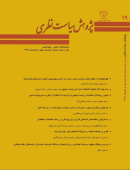بررسی جایگاه مفهوم سرمایۀ اجتماعی در پارادایمهای سهگانۀ توسعه (نوسازی، وابستگی، نظام جهانی)
محورهای موضوعی : Research in Theoritical Politics
1 - دانشگاه یزد
کلید واژه: سرمایۀ اجتماعی پاردایمهای توسعه نوسازی وابستگی نظام جهانی.,
چکیده مقاله :
این نوشتار می کوشد به این پرسش پاسخ دهد که در کدام یک از پارادایم های اصلی توسعه (نوسازی، وابستگی و نظام جهانی)، به مفهوم سرمایۀ اجتماعی و مؤلفه های آن توجه شده است؟ برای پاسخ به این پرسش، ابتدا تعريفي جامع از سرمایۀ اجتماعی ارائه می شود. سپس با در نظر گرفتن این تعریف و با روش توصیفی- تحلیلی و با ابزار جمع آوری اطلاعات و داده ها از منابع موجود کتابخانه ای، آثار برجسته ترین اندیشمندان این سه پارادایم بررسی می شود. یافته های تحقیق نشان می دهد که سرمایۀ اجتماعی، در گرایش های متأخر پارادایم نوسازی به دلیل نگرش معطوف به نیروها و عوامل داخلی (دروننگری) و اهمیت دادن به متغیرهای فرهنگی و اجتماعی در روند توسعۀ کشورها، تا حدی مورد توجه قرار گرفته است. اهتمام نسبی پارادایم نوسازی به مفهوم سرمایۀ اجتماعی، از نقاط قوت آن محسوب شده و تداوم آن در عصر طلایی سرمایه اجتماعی را ممکن کرده است.
this paper tries to answer this question that in which of the main development paradigms (modernization, dependence, global system), the concept of social capital and its constituents have been given attention? For answering this question, first of all, the comprehensive definition of social capital is presented. then considering this definition and through definition and analytic method, and via the data gathering instruments in existing librarian sources ,the writings of most prominent intellectuals of these paradigms are studied. The findings of the research shows that the social capital in recent tendencies of modernization paradigm, because of the attitude toward faculties and internal factors(introspection) and emphasizing social and cultural variables in the development procedure of countries, has been focused to some extent. The relative commitment of modernization paradigm toward social capital, can be considered as its forte (strong point) and make its endurance possible in golden age of social capital
